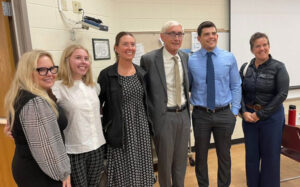success story
GROWing our own teachers
Rural communities grapple with teacher shortage
Wisconsin Heights spearheads program to turn its own students into teachers
School districts throughout Wisconsin are struggling to recruit high-quality educators–with college degrees, state certification and expertise in their given field—and convince them to stick with the job for the long term. The problem is particularly acute in rural communities. In the past, the Wisconsin Heights school district fielded 25 to 30 applications for each open teaching position. Now, only three or four applications trickle in. “What we’re seeing is that the pool just gets more and more shallow,” Wisconsin Heights District Administrator Jordan Sinz says. “There are a number of rural districts in the state of Wisconsin that just can’t fill positions.”
 Four south central Wisconsin districts collaborate
Four south central Wisconsin districts collaborate
Sinz and Liz Dostal, principal of Wisconsin Heights Middle/High School, devised a plan for rural districts to “grow their own” teachers by targeting their own students and offering them college scholarships to major in education, with the ultimate goal of returning to teach in the schools they had attended. School districts in Cambridge, Lodi and Sauk Prairie joined in, and with help from the UW-Madison’s Center for Education Research, created the Grow Our Own (GROW) Cooperative.
- High school students can take up to 12 credits through UW-Whitewater and get mentored by teachers in their field of interest.
- Each district offers a $1,000 scholarship to a senior planning to major in education.
- Each year, 10 scholarships of $2,000 each will be available to college freshmen and sophomores planning to major in education.
- When students are accepted into schools of education, they can apply for $10,000 scholarships to complete their degree.
- In return, scholarship recipients will apply to work at GROW schools and, if hired, will commit to teaching at those schools for three years.
Research shows that teachers who are attracted to jobs in rural school districts are often those who attended rural schools themselves, Sinz says.
GROW Cooperative wins a $264,000 Workforce Innovation Grant
With help from the grant, awarded in June 2022 by a joint program of the Wisconsin Economic Development Corporation and the Department of Workforce Development, the four school districts chose their first five $10,000 scholarship winners, all of whom will complete their degrees in education in the 2022-23 school year. A total of 61 students applied for the funds.
“This is just the first step in building the teacher pipeline,” Sinz says.



